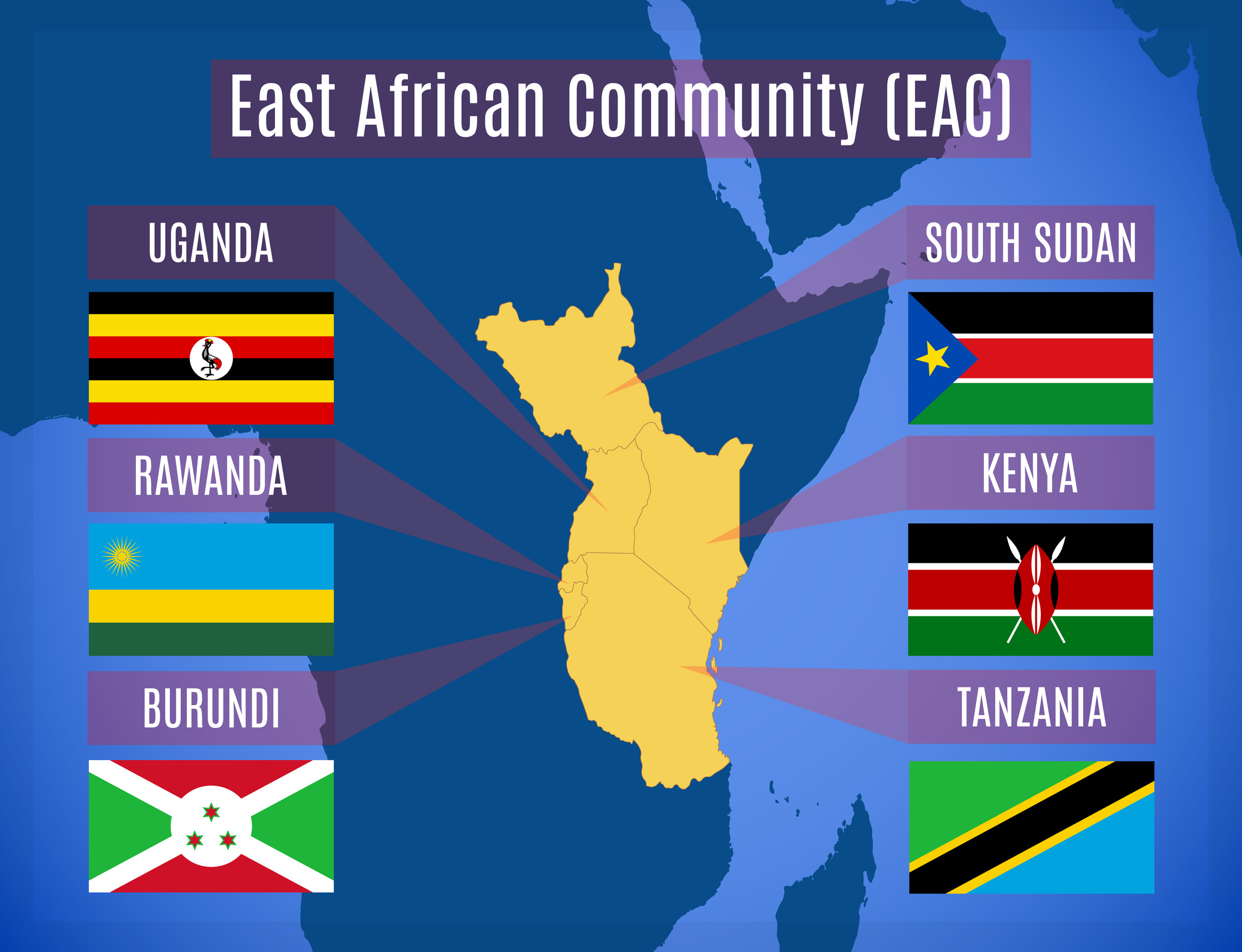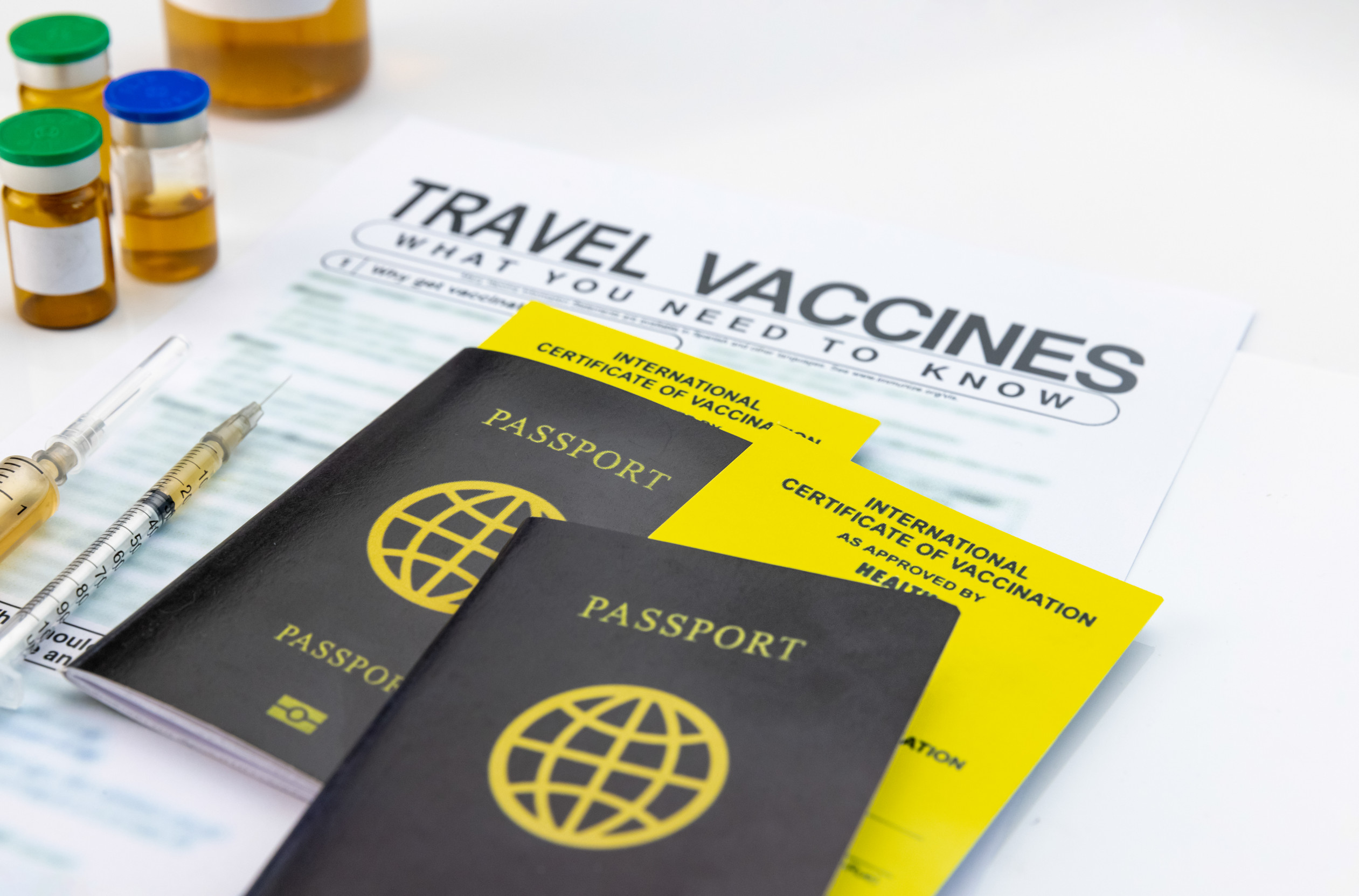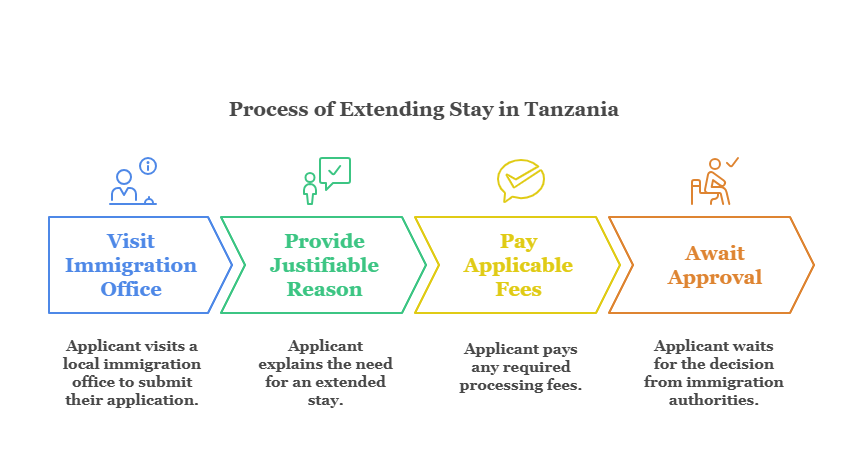
The East African Community (EAC) is a regional intergovernmental organization made up of six partner states: Tanzania, Kenya, Uganda, Rwanda, Burundi, and South Sudan. One of the key benefits of EAC membership is the free movement of people within the region. This means that nationals of these countries do not require a visa to travel to other EAC member states for short visits.
Tanzania Visa Exemption for EAC Nationals
The East African Community (EAC) promotes regional integration and ease of movement among member states. As part of this agreement, citizens of EAC countries can travel freely within the region without needing a Tanzania eVisa. This policy strengthens economic ties, encourages tourism, and facilitates cross-border trade and cultural exchange.
Nationals of the following East African Community (EAC) member states do not require a visa to enter Tanzania:
✅ Tanzania
✅ Kenya
✅ Uganda
✅ Rwanda
✅ Burundi
✅ South Sudan
These nationals can travel freely within the EAC region without needing a visa, as long as they meet the basic entry requirements.
Tanzania Entry Requirements for EAC Nationals
The East African Community (EAC) promotes free movement among member states, allowing citizens to travel without a visa. However, visa exemption does not mean unrestricted entry—travelers must still meet certain entry requirements. Understanding these requirements ensures a smooth and hassle-free experience when crossing borders.
Valid Travel Documents to Tanzania for EAC Citizens

EAC nationals can enter Tanzania using one of the following documents:
- Valid Passport – Recommended for all international travel and widely accepted at border crossings.
- National ID Card – Only applicable for citizens of Kenya, Rwanda, and Uganda under the EAC agreement.
- EAC e-Passport – A biometric passport issued by EAC member states, enhancing security and ease of travel.
- Temporary Travel Documents – Issued in special cases, such as emergencies or loss of a passport. These may require additional verification at entry points.
Additional Entry Requirements
While no visa is required, travelers must still comply with standard entry regulations:
- Proof of Onward or Return Travel – Some border officials may request evidence of onward travel, such as a return ticket.
- Purpose of Visit – Travelers should clearly state their reason for entry (tourism, business, family visits, etc.). Extended stays for work or study may require special permits.
- Health and Vaccination Requirements – Depending on recent travel history, a yellow fever vaccination certificate may be required, especially for travelers coming from high-risk countries.
- Customs Regulations – All travelers must comply with Tanzanian customs laws regarding the importation of goods, currency declaration, and restricted items.
Rights and Benefits of EAC Nationals Traveling to Tanzania
Visa-Free Entry – No need to apply for a visa, saving time and costs.
Extended Stay Privileges – EAC citizens are generally allowed longer stays compared to travelers from non-EAC countries.
Work and Business Opportunities – The EAC promotes regional economic integration, allowing citizens to engage in business and employment under certain agreements.
Use of National ID for Travel – Some EAC nationals (Kenya, Rwanda, and Uganda) can travel using only their national ID, making cross-border movement easier.
Length of Stay for EAC Nationals in Tanzania
Citizens of East African Community (EAC) member states can enter Tanzania without a visa and stay for an extended period under the region’s free movement agreement. However, there are limits on how long they can remain in the country without additional permits.
Standard Stay Duration for Visa Free Travel
Up to 90 Days – EAC nationals can stay in Tanzania for a maximum of 90 days (3 months) per visit without a visa. This applies to tourism, business visits, family visits, and other short-term stays.
No Work Without a Permit – While EAC citizens can move freely within the region, engaging in formal employment or long-term business operations requires a relevant work or residence permit.
Extending the Stay Beyond 90 Days in Tanzania
If an EAC national wishes to stay in Tanzania beyond 90 days, they must apply for an extension through Tanzania’s Immigration Services Department. The process includes:
- Visiting an Immigration Office – Applications must be submitted in person at a local immigration office in Tanzania before the 90-day period expires.
- Providing a Justifiable Reason – Applicants may need to explain why they require a longer stay (e.g., business activities, extended tourism, or personal matters).
- Paying Applicable Fees – Depending on the extension request, there may be a processing fee.
- Approval is Not Guaranteed – Extensions are granted at the discretion of immigration authorities, and applicants must comply with Tanzanian immigration laws.

Special Cases for Long-Term Stay
For EAC nationals intending to stay beyond 90 days for work, study, or residency, different permits apply:
- Residence Permit – Required for those planning to live in Tanzania long-term, including retirees and family dependents.
- Work Permit – Necessary for employment in Tanzania, even for EAC nationals.
- Business Permit – If engaging in trade or business beyond short-term visits, a business permit may be required.
Purpose of Travel of Visa Free Travel to Tanzania for EAC Nationals
EAC nationals can enter Tanzania without a visa for the following purposes:
|
Purpose of Travel |
Description |
Additional Notes |
|
Tourism |
Visiting Tanzania’s national parks, beaches, historical sites, and other attractions. |
No work or business activities allowed under a tourist visit. |
|
Family Visits |
Visiting relatives, attending family events, or reuniting with loved ones. |
Stays beyond 90 days may require an extension. |
|
Short-Term Business Trips |
Attending meetings, networking, or engaging in temporary business discussions. |
Formal employment is not permitted without a work permit. |
|
Official Government Visits |
Government officials traveling for official duties within the EAC framework. |
Must carry relevant identification and official documents. |
Travel Purposes Requiring Additional Permits
While EAC citizens can travel visa-free, they may need additional permits for:
- Employment or Long-Term Business Activities
EAC nationals cannot work in Tanzania without a work permit, even if they are visa-exempt. Entrepreneurs or business owners planning to establish a company or engage in long-term trade may require a business permit or investor permit.
- Studying at an Educational Institution
Enrolling in a Tanzanian university, college, or school requires a student permit. Some educational programs may have additional requirements, such as proof of financial support and health insurance.
- Permanent Residence
EAC nationals who wish to live in Tanzania long-term must apply for a residence permit. There are different types of residence permits, depending on whether the applicant is a retiree, dependent, or business investor.
EAC e-Passport and Its Benefits to Travelers
The EAC e-Passport is a biometric passport introduced to facilitate seamless travel within the region. It is currently issued by Kenya, Uganda, Tanzania, Rwanda, and Burundi, with South Sudan expected to implement it soon.
Benefits of the EAC e-Passport:
✅ Recognized by all EAC countries
✅ Allows easier border crossings with automated immigration systems
✅ Promotes regional integration and free movement of people
Tip: If you frequently travel within the EAC, consider applying for an EAC e-passport to avoid carrying multiple documents.
The East African Tourist Visa
While not a visa exemption, the East African Tourist Visa (EATV) is a special initiative that simplifies travel between Kenya, Rwanda, and Uganda for tourism purposes. This visa promotes regional tourism and enhances movement between these three participating East African Community (EAC) member states.
What Is the East African Tourist Visa?
The EATV is a multiple-entry visa that allows visitors to travel freely between Kenya, Rwanda, and Uganda using a single visa. It is designed to encourage multi-country tourism within the EAC region by reducing the need for separate visa applications for each country.
Key Features of the East African Tourist Visa include:
- Multiple-Entry Visa – Allows unlimited entry between Kenya, Rwanda, and Uganda during its validity period.
- Valid for 90 Days – Travelers can stay for up to 90 days within the three participating countries.
- Single Fee – Instead of applying for separate visas, travelers pay one visa fee, making it cost-effective.
- Tourism-Only – The EATV is strictly for tourism purposes and does not permit work, study, or business activities.
Which Countries Are Part of the EATV?
|
Country |
Participation in EATV |
|
🇰🇪 Kenya |
✅ Yes |
|
🇷🇼 Rwanda |
✅ Yes |
|
🇺🇬 Uganda |
✅ Yes |
|
🇹🇿 Tanzania |
❌ No |
|
🇧🇮 Burundi |
❌ No |
|
🇸🇸 South Sudan |
❌ No |
Tanzania, Burundi, and South Sudan are not yet part of the EATV program. Travelers visiting these countries must apply for separate visas.
Who Can Apply for the EATV?
Non-EAC Nationals – The EATV is designed for foreign tourists who are not citizens of EAC member states but want to visit multiple East African countries on one trip.
EAC Nationals Do Not Need the EATV – Citizens of Kenya, Rwanda, Uganda, Tanzania, Burundi, and South Sudan do not need this visa since they can travel visa-free within the region.
Border Crossings and Immigration Procedures
EAC nationals can enter another EAC country through official border points by presenting:
✔ A valid passport or national ID
✔ A Yellow Fever vaccination certificate (if required)
✔ A temporary travel permit (in exceptional cases)
At immigration, travelers may be asked about:
- The purpose of their visit
- Their intended length of stay
- Their accommodation details
Tip: Even though visa-free travel is allowed, always carry identification documents to avoid delays at border crossings.
Does Visa Free Travel Apply to Refugees in EAC Countries?
No, refugees living in East African Community (EAC) countries do not qualify for visa-free travel between member states. Even if they reside legally in an EAC country and hold refugee travel documents issued by that state, they must still apply for a visa when traveling to another EAC country. Each country has specific visa policies for refugees, and approval is not guaranteed.
Can Dual Citizens Benefit from Tanzania Visa Exemptions?
Yes, individuals who hold dual citizenship, with one nationality from an EAC country, can benefit from visa-free entry when traveling within the EAC. However, they must use their EAC passport or national ID card at border crossings to qualify. If they enter using a non-EAC passport, standard visa rules for that nationality will apply, and they may need to obtain a visa before entry.
What Happens If You Overstay the 90-Day Limit in Tanzania?
Overstaying beyond the allowed 90-day limit can lead to penalties, including fines, legal consequences, or even deportation in serious cases. To avoid these penalties, travelers must apply for a visa extension at the immigration office before their permitted stay expires. Extensions are granted at the discretion of immigration authorities, and failing to comply with the rules could impact future travel within the EAC region.
Future of Free Movement in the EAC
The EAC is working towards creating a fully integrated region, where people can travel, work, and live freely across all member states. Future plans include:
- Full implementation of the EAC e-Passport
- A regional work permit system to allow EAC nationals to work freely in any member state
- Greater harmonization of immigration policies to improve border efficiency
If these plans succeed, EAC nationals will enjoy even greater freedom of movement in the future.
Final Tips for EAC Travelers
✔ Always carry identification (passport or national ID) when traveling.
✔ Respect local immigration rules, even if no visa is required.
✔ Apply for work or study permits if staying long-term.
✔ Be aware of health regulations, such as Yellow Fever vaccine requirements.
✔ Stay updated on EAC travel policies, as they may change over time.
Frequently Asked Questions
No, citizens of East African Community (EAC) member states (Kenya, Uganda, Rwanda, Burundi, and South Sudan) can enter Tanzania without a visa for up to 90 days for tourism, family visits, and short-term business trips.
No, EAC nationals cannot work in Tanzania without a work permit. Even though they can enter without a visa, they must apply for the appropriate work authorization before starting any job.
Overstaying can result in fines, legal action, or deportation. To avoid penalties, travelers must apply for a visa extension before their 90-day stay expires.
No, the East African Tourist Visa (EATV) is only valid for Kenya, Rwanda, and Uganda. Travelers visiting Tanzania must obtain a separate visa if they are not EAC nationals.
Yes, but they must apply for a residence permit through immigration. The process depends on the reason for residence, such as employment, business, or family reunification.
Content Disclaimer: While this information was last updated in March 2025, we strongly suggest confirming all travel details with the appropriate governmental agencies, embassies, and airlines.

To help us improve